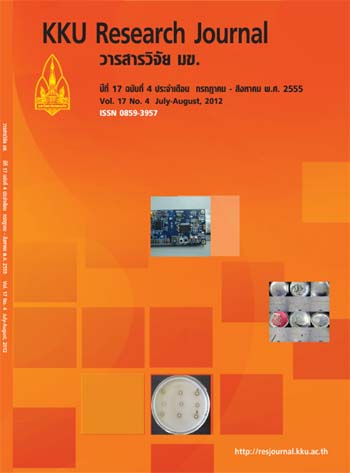Potential use of shochu kasu to produce exopolysaccharides from Lactobacillus sakei CY1 and their effect on soil aggregation
Main Article Content
Abstract
Shochu, a distilled beverage from Japan, generate in distillery waste, which contain high concentration of organic matter that can cause environmental problem. In this study, we determine the utilization of shochu kasu (distillery waste) as nutrient source for Lactobacillus sakei CY1 to produce extracellular polysaccharides in order to make this wastewater be a valuable material. The highest yield of Lactobacillus sakei CY1 exopolysaccharides (4.6 g/L) was obtained from the basal medium supplemented with 75% (v/v) of shochu kasu at 30°C and pH of 6.2. The polymer produced consisted of 25% of glucose and 13% of galactose and 62% of other sugar. To determine the effectiveness of L. sakei CY1 as a biological agent for the improvement of soil quality with shochu kasu as culture media, we examined the effect of L. sakei CY1 on soil aggregation in indoor experiment. The extent of aggregation was determined after 28 days of culture inoculation on sandy soil by varying concentration of shochu kasu on culture media. We compared these results with those obtained using chemical defined media. The application of shochu kasu as nutrient source obviously improved the level of aggregation, 70-80% of soil particles adhere to each other and build up macro-aggregates, which have an important role in the soil stabilization. These results indicate than L. sakei CY1 with shochu kasu as culture media can be potentially be used to improve soil structure.
Article Details
How to Cite
Yuliani, E., Imai, T., & Tomita, S. (2017). Potential use of shochu kasu to produce exopolysaccharides from Lactobacillus sakei CY1 and their effect on soil aggregation. Asia-Pacific Journal of Science and Technology, 17(4), 580–592. retrieved from https://so01.tci-thaijo.org/index.php/APST/article/view/83270
Section
Research Articles


